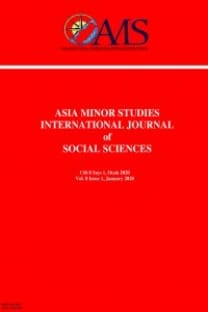Tez Yazım Sürecinde Öğrencinin Danışmanı Tarafından İzlenmesini Sağlayan Zotero'nun Grup Özelliğinin İncelenmesi
The Investigation Group Feature of Zotero that Providing Adviser to Monitoring Student during Thesis Writing Process
Zotero, Zotero Group, Thesis, Supervisor, Student, Monitoring,
___
Ay, G. M. (2017). Akademik araştırmalar için bilişim araçları. Eskişehir: Gökçe Mehmet AY.Blakesley, D., & Hoogeveen, J. L. (2011). Writing: A Manual for the digital age, brief, spiral bound version. USA: Cengage Learning.
Childress, D. (2011). Citation tools in academic libraries. Reference & User services Quarterly, 51(2), 143-152. https://doi.org/10.5860/rusq.51n2.143
Engard, N. (2010). Practical open source software for libraries. Elsevier.
Fernandez, P. (2011). Zotero: information management software 2.0. Library Hi Tech News, 28(4), 5-7. https://doi.org/10.1108/07419051111154758
Hensley, M. K. (2011). Citation management software: Features and futures. Reference & User Services Quarterly, 50(3), 204-208. Geliş tarihi gönderen JSTOR.
Jahng, I. (2017). Research guides: Zotero: Add references & PDFs. Geliş tarihi 15 Mayıs 2019, gönderen //umb.libguides.com/c.php?g=699409&p=4960604
Muldrow, J., & Yoder, S. (2009). Out of cite! How Reference managers are taking research to the next level. Political Science and Politics, 42(1), 167-172. Geliş tarihi gönderen JSTOR.
Neal, D. R. (2012). Social media for academics: A Practical Guide. Elsevier.
Ovadia, S. (2013). The librarian’s guide to academic research in the cloud. Elsevier.
Öney, C. (2019). Akademik araştırma, organize olma ve yazma süreçlerinde zotero. Tarih ve Gelecek Dergisi, 5(1), 160-181. https://doi.org/10.21551/jhf.557229
Polat, C., & Binici, K. (2015). Zotero, bilimsel araştırma sürecinde bireysel kaynak yönetimi aracı. Geliş tarihi gönderen http://www.kutuphane.sakarya.edu.tr/sites/kutuphane.sakarya.edu.tr/file/zotero2015.pdf
Puckett, J. (2011). Zotero: A guide for Librarians, researchers, and educators. Yayın Yeri Yok: Amer Library Assn.
Puckett, J. (2019, Nisan 11). GSU library research guides: Zotero: Shared Libraries. Geliş tarihi 11 Nisan 2019, gönderen //research.library.gsu.edu/c.php?g=115275&p=751428
Raffelt, A. (2016). Theologie studieren: Einführung ins wissenschaftliche arbeiten. Basel: Verlag Herder GmbH.
Shaw, R., Golden, P., & Buckland, M. (2012). Integrating collaborative bibliography and research. Proceedings of the American Society for Information Science and Technology, 49(1), 1-4. https://doi.org/10.1002/meet.14504901245
Thesis Advisor & Thesis Committee | Vision Science (MS). (2016, Haziran 2). Geliş tarihi 15 Mayıs 2019, gönderen Pacific University website: https://www.pacificu.edu/ms- vision-science/academic-procedures/thesis-advisor-thesis-committee
Watkins, A. (2013). Zotero for Personal Image Management. Art Documentation: Journal of the Art Libraries Society of North America, 32(2), 301-313. https://doi.org/10.1086/673519
Weiler, Y. (2017). Schreiben Kann Ich: Eine wissenschaftliche Arbeit in 30 Stunden. Wien: UTB.
Zotero: A starter guide for history students. (2019, Nisan 10). Geliş tarihi 10 Nisan 2019, gönderen https://history.vcu.edu/undergraduate-program/resources-for- undergrads/zotero-a-starter-guide-for-history-students/
Zotero recent discussions forum. (2019, Nisan 10). Geliş tarihi 10 Nisan 2019, gönderen Zotero Forums website: https://forums.zotero.org/discussions
- ISSN: 2147-1673
- Yayın Aralığı: Yılda 2 Sayı
- Başlangıç: 2013
- Yayıncı: Serhat KUZUCU
Mehmet Ali Kalkan'ın Hayatı, Sanatı ve Şiirleri Üzerine Bir Değerlendirme
Türkiye'nin Coğrafi İşaret Niteliğindeki Jeolojik Değerleri
Güven ŞAHİN, Süheyla BALCI AKOVA
Foucault’da İktidar, Beden ve Özne Üçlüsü
Erhan ALPASLAN, Tülay GÖKDEMİR
İskit, Asur ve Perslerin Siyasi ve Kültürel Farklılıkları Üzerine Bir Değerlendirme
